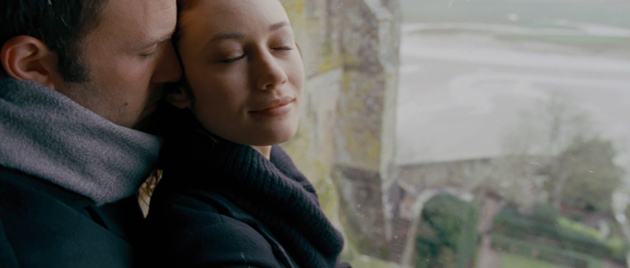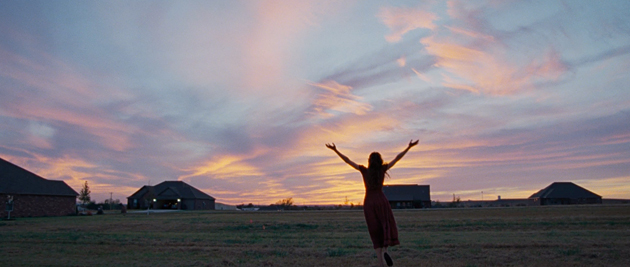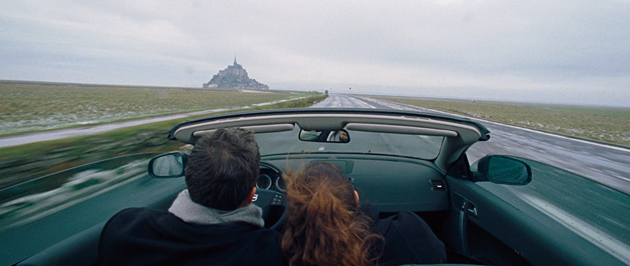Terrence Malick’s Song of Songs
Does To the Wonder reveal a director lost in his own vision?
 To the Wonder, now opening across the country, is far and away Terrence Malick’s most sensual film, which might be his way of sidestepping common sense. We see bare chests, enough sexual intimacy to warrant an R rating, one moment after another of men cupping women’s faces as the light runs along a long naked neck. The reclusive director’s last two pictures were carried in large part by the faces of Brad Pitt and Colin Farrell; in The Thin Red Line, the epic that preceded them in 1998, more than twenty-five actors crowded an enormous canvas for 171 minutes, in what was essentially a woman-free exploration of the landscape of maleness.
To the Wonder, now opening across the country, is far and away Terrence Malick’s most sensual film, which might be his way of sidestepping common sense. We see bare chests, enough sexual intimacy to warrant an R rating, one moment after another of men cupping women’s faces as the light runs along a long naked neck. The reclusive director’s last two pictures were carried in large part by the faces of Brad Pitt and Colin Farrell; in The Thin Red Line, the epic that preceded them in 1998, more than twenty-five actors crowded an enormous canvas for 171 minutes, in what was essentially a woman-free exploration of the landscape of maleness.
Yet in his new film, the camera dwells lovingly on the luminous depths and Botticellian grace of the former Bond girl Olga Kurylenko. Rachel McAdams and Romina Mondello flit in and out of the story; Mondello almost wakes the film up from its swoony daze with her shows of spirit, and the complexity and life in both their faces plays off Ben Affleck’s wooden, straight-jawed Americanism like light across a telephone pole. Malick’s last film, The Tree of Life, two years ago, was clearly a family story, excavating pieces of the director’s own painful youth in Texas at the hands of a domineering father. His latest seems interested mostly in the twists of love and faithlessness, presented as though a scatter of photographs had been torn out from a wedding album, then cut up and rearranged haphazardly to recall a shattered marriage.
The Tree of Life was clearly Malick’s attempt to offer a majestic cinematic Book of Job; To the Wonder is more like his diaphanous, lyric Song of Songs. In both cases, though, one gets the sense of a director, now sixty-nine years old, trying to pull out fragments of his own story to lend a personal intensity and resonance to the Biblical frames and philosophical enquiries that have always come so naturally to him. Yet in both, the procedure is so elliptical and allegorical that one also gets the sense of a man of great depths muttering to himself, unable to make his private dramas fully intelligible to the world at large. For those of us who see in him one of the transformative artists of the time, the film ends up like an homage to all that he can’t communicate.
The action in Malick’s latest inaction movie can be summarized in a sentence: Marina (Kurylenko), a beautiful European woman, meets Neil, an all-American guy (embodied, almost silently, by Affleck), in Paris and follows him back to the wide-open spaces of Oklahoma, where she experiences the displacement of a Proustian in a Melvillean land, sees him exchange glances with a former flame (McAdams), and hears her doubts echoed on a larger canvas by a priest, Father Quintana (played by a ravaged Javier Bardem). Of all the many directors now claiming to be borrowing from Terrence Malick, none does so more raptly than Malick himself: here is a flow of scenes stalking Marina through golden fields at the magic hour, shot from the back; here is sunlight on a river and the sun above tall trees; here are the stained-glass windows, the Shaker-like modern spaces, the leafy suburban streets of Tree of Life (from which some of the footage is actually taken), mixed with the spritelike dances through the elements seen in The New World (2005). The movie’s love scenes play out the betrayals and reminders of impermanence of Days of Heaven (1978) within the gauzy romantic curtains of The Thin Red Line.
Yet this is also Malick’s first impenitently contemporary film. There are fast-food joints, grocery stores, even a Skype conversation for his magpie camera to dart around and light up. There are glassy airports and high-school marching bands and the scarred white walls of the Paris Metro. As in all his works, trains jut into unpeopled, virgin landscape while suburban homes sit lonely amidst annihilating spaces. For those who’ve entered into the unwavering theology laid out in the five films Malick has released across forty years, this means we’re fully in the divided City of Man, longing to find a way back to something resembling the City of God.
In the scenes where the camera roams around Kurylenko’s face and her dancing form, we might, at times, be panning across a Renaissance portrait, seeing in the same frame both a Madonna and the suggestion of something fallen, even demonic. Malick, who studied Wittgenstein under Gilbert Ryle at Oxford as a Rhodes Scholar and famously translated a book by Heidegger at the age of twenty-five, has always had a gift for communicating through faces, and for letting images carry the weight of his ideas. In his best moments (passages of light and shadow in Days of Heaven, parts of The New World and The Tree of Life), he articulates philosophy through lyrical poetry, as an Emerson might have tried to do, translating idealism into concrete scenes and sounds.
“He does not find her lovely; he makes her lovely,” intones Father Quintana in one of the movie’s many voice-overs. Malick might be giving us his entire aesthetic creed in that. The everyday stuff of life — children’s games, a trip to what looks like Kmart, a couple’s journey to Mont St. Michel (the “wonder,” shown early on, that presents the harmony the lovers long to return to) — can be sublime, a glimpse of that wholeness out of which we have fallen. The camera becomes the director’s transparent eyeball, picking out stray images, fleeting plays of light, snatches of the passing scene, as if chancing upon gifts of grace. Yet Malick also brings a tonic groundedness to his contemplative work, in part because he is such a collector of unconsidered trifles: he can never resist an almost deformed, barely human face along the margins (like something out of Flannery O’Connor), a flash of something ancient in the mess of the modern world, or random bits of mumbled dialogue (the equivalent of Annie Dillard publishing found poetry in her book Mornings Like This). By all accounts, in making films, he simply lets his camera roll to see what epiphanies it can pick up where nobody might think to find them.
At the same time, To the Wonder makes one realize all that Malick has lost in surrendering narrative to gathered moments. Voice-overs in Days of Heaven were delivered in the salty New Yawk twang of Linda Manz, an untutored actor who improvised lines that evoked a homemade Book of Revelation, as earthy and immediate as a child’s nightmares. In that film, Malick matched a colloquial looseness out of Huck Finn with a story taken from the Bible in order to turn a young America into a setting for stories of fire and locusts and divine retribution. When the camera picked out a broken glass in a river, when it began with a small inferno in a factory, when it showed wolves running up slopes at night like Nature’s monitors (or God’s spies), there was a precision to the imagery that gave the moments of transport a frame and a symbolic charge.
To the Wonder, by comparison, lacks music — literally, in the sense that its score cannot catch the sweetness that Ennio Morricone conjured up for Days of Heaven, and metaphorically, in that the images lack compression and rhythm, and therefore meaning. Gone are the mad fiddle music of Doug Kershaw, the dirtied immigrant faces, the wide-awake, spooky narrative. (“We seen trees that the leaves are shaking, and it looks like shadows of guys coming at you and stuff.”) Instead, Marina, in love, says, “Open me. Enter me,” or “I in you. You in me.” In moments of anguish, Father Quintana murmurs, “Everywhere you’re present. And yet I can’t see you.” Javier Bardem’s ancient face is harrowed and full of torment, his voice so resonantly inhabited that he gives his doubts more substance than the words deserve. Yet it’s sobering that perhaps the most eloquent director in contemporary American film is offering us platitudes.
It’s apt that Bardem, who played something akin to the Devil in the film of Cormac McCarthy’s No Country for Old Men, takes on the role of a man of God here; Malick has always shared with his fellow Plains mystic an ability to find God and his shadow hiding out in the American grain, and an otherworldly lyricism that plays out a story of Old Testament justice and brutality through a few solitary drifters in the West. But like McCarthy, Malick seems to live so far from the world these days that many of what must sound to him like revelations are, in truth, commonplaces; he alternates scenes of overpowering grandeur with lines a sophomore might blush at. (Marina’s assessment of America: “A place so calm. Honest. Rich.”) It’s as if he’s so lost inside his own vision that he has no sense of how others speak and think. I noted with relish three names listed in the credits as “Humanity Unit Consultants.”
No one walked out of the To the Wonder showing I attended on the first day of its run in Los Angles. (I saw The Tree of Life in the same cinema, and perhaps half the audience headed for the exits, many during the early twenty-minute, IMAX-worthy sequence early showing the history of the world.) I could feel the audience loosening up when Marina said, in French, “Stop being so serious,” and again when a wild black man—one of the few men of color in Malick’s world—told Father Quintana in church, “Got to have a little more excitement!” And when Romina Mondello, in a glancing exchange, screamed out against the deadness, the blankness, the nowhereness of the Oklahama landscape, we might have been hearing not just Malick’s beloved theme of Old World fallenness circling round New World openness, and not just his cry against the world he grew up in (much of the film was shot in the same small town where his parents once lived, Bartlesville, Oklahoma), but one part of the director crying out against the other.
I will never forget the day thirty-four years ago when I walked into a Sunday afternoon showing of Days of Heaven in Cambridge, Massachusetts, just after it was released. I had never seen a work so transfixing, or met a film so intellectually rich and dense and eloquent that nonetheless pierced and uplifted me in some place beyond the reach of words. When his swelling music and found poetry come together, Malick can make us feel something above us and within us, moments of transformation (or days of heaven) that we seldom glimpse; he gives us much of the classical wisdom we recognize from Greek tragedy or philosophy textbooks, but also in, say, Kurylenko’s face, something of that transfiguring beauty we see in the person beside us when we’re in love. That rigorous commitment to emotional and even spiritual effects made me steal away from a dozen obligations so I could see the film again the following day, and then more than thirty times in the next few years.
But nowadays Malick seems to have reached a point where, in trying to be personal, he has squandered some of the impersonal power of his films; humans are really just pawns and props in his landscape — silhouettes — and when he tries to humanize them, he too often ends up with neither allegory nor realism. Perhaps, as he nears his seventies, he’s planning to give us looser, thrown-off sketches from his notebook, as Philip Roth and Don DeLillo have done, or as Leonard Cohen did in his 2004 record Dear Heather — though Cohen could offer Malick a lesson in how Romantics can grow up through the use of irony and self-questioning. Those of us who love Malick’s uncompromising daring and American originality can celebrate the fact that he has finally won acclaim and global exposure (notably the Palme d’Or at Cannes for The Tree of Life) even as his films seem to have relinquished some of the tightness and narrative bite and brilliance of Days of Heaven and Badlands.
For now, though, we must content ourselves with rough drafts like To the Wonder, which seems at once rich and cursory, lavish in scenes of transcendent beauty that add up to a fraction of their parts. I would gladly watch it again and again, especially for the scenes with Kurylenko and Bardem, much as I’d listen to a piece by Bach for its moments of radiance; no one can turn film into a vehicle for illumination as Terrence Malick does. And had this been the first of his films that I’d seen, I’d acknowledge it as one of the most transporting and individual films of my lifetime. But I can’t say I’d recommend it to many people, and I wish someone would bring Malick out of his unworldly reveries and remind him of what happened to Wordsworth as he aged. His films continue to give us more beauty than we’ll see elsewhere in the Cineplex or most other places, but each one only hints at the greater stuff that this lonely explorer, fashioning exquisite pictures in the editing room, has yet to bring forth from his exalted solitude.




